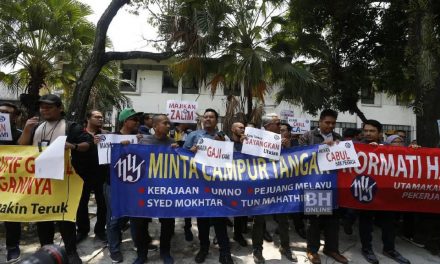AS a human resources practitioner, it was meaningful to be part of the job fair co-organised by polytechnic Ungku Omar and Socso in Ipoh on March 18. The applicants included fresh graduates, those retrenched from the manufacturing sector, housewives searching for fresh careers and civil servants.
Looking through resumes and after brief interviews with applicants, I realised the rigid employment market in Perak, where people who have been in the industry for years with specific knowledge and skills are at a
loss when they are retrenched since their knowledge and skills are not suitable for other industries.
If employed, they have to take a pay cut since they need to relearn the nature of their new jobs.
As for graduates who have a degree in a particular field of study, they have no market value if they do not go through practical experience for at least two years to complement their degree.
Unless a certain duration of practical experience is there, salaries will not grow.
I met a senior person who has a mechanical engineering degree, who worked as a regulator of vehicles in a government agency, but lost his job recently, and could not fit into the jobs that were vacant.
He has never practised his engineering skills and even if companies were to employ him, his market value in terms of salary and position would be low since he has to start from the bottom.
There were also clerical job seekers who had worked for big companies but were retrenched due to automation of administrative functions.
Based on current technological development, analysts have suggested that one has to reskill to survive in the job market. Learning new skills alone will not be adequate.
It requires direction and purpose among job applicants where the contents of their resume would show a clear chain of career progress with an acceptable duration of years and knowledge of the given industry.
There are three areas of consideration to resolve issues of retrenchment and skills mismatch:
INCREASE duration of internship. For undergraduates, extend the internship duration to six months or a year depending on the type of industry to ensure knowledge and skills are developed in this period.
If there is a vacancy, the student should be incorporated by the particular organisation if
he performs to expected standards.
CROSS industrial training. It’s vital for education institutions to expose students to cross-industrial training to make them employable.
For example, engineering students who are qualified for manufacturing should also learn about the services industry.
For mechanical engineering students trained in servicing and repairing machines in manufacturing — they should also learn specific skills of hotel technicians, such as plumbing, carpentry, and wiring.
CAREER evolution through technological training. In this technological age it is vital that senior workers and housewives who want to work are trained in digital and green technology.
Entrepreneur skills could also be honed.
There should be a nationwide programme to encourage all workers to enrol in such courses which should be made available, nearest to one’s home. The government should help build learning institutions that are people-friendly and create a budget for such a programme.
RONALD BENJAMIN
Executive secretary, Association for Community and Dialogue









